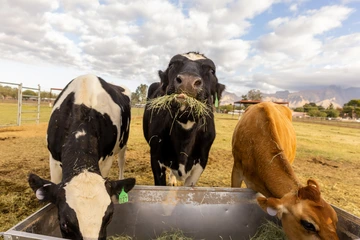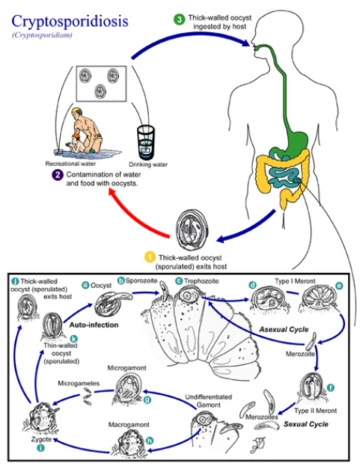Cryptosporidium Production Laboratory
Located in the School of Animal and Comparative Biomedical Sciences at the University of Arizona, the Cryptosporidium Production Laboratory is one of the largest producers of Cryptosporidium parvum oocysts and Nluc C. parvum oocysts. Cryptosporidium research efforts in the Cryptosporidium Production Laboratory have contributed to monoclonal antibody detection techniques, production and purification methods, viability testing methods and genomic identification methods.
About Us

The Cryptosporidium Production Laboratory is located at the University of Arizona within the School of Animal and Comparative Biomedical Sciences. The lab is one of the largest producers of Cryptosporidium parvum oocysts and Nluc (containing the luciferase gene; Genetic modification of the diarrhoeal pathogen Cryptosporidium parvum. Vinayak, S., et al. 2015. Nature. 523:477-480) C. parvum oocysts, which is shipped to numerous customers worldwide (described in Schaefer D. et. al. 2016. Journal of Infectious Diseases, 214:1856-1864). Cryptosporidium research efforts in the Cryptosporidium Production Laboratory have contributed to monoclonal antibody detection techniques, production and purification methods, viability testing methods and genomic identification methods.
We are also available for testing promising new candidates for treating cryptosporidiosis (drugs, colostrum, MAbs, etc.). These would be evaluated in the Riggs’ laboratory at the University of Arizona. The goal of the project would be to conduct efficacy and safety/toxicity testing of treatment candidates in the calf model of clinical cryptosporidiosis to identify leads. PK studies can also be performed in calves. If you are interested, please see the Contacts page.
Production of the Iowa isolate oocysts consists of propagation in neonatal Holstein calves approximately 1 - 2 times per month. The oocysts are purified using discontinuous sucrose and cesium chloride centrifugation gradients. Our purified oocysts are stored at 4 degrees Celsius in an antibiotic solution containing 0.01% Tween 20, 100U of penicillin, 100 ug of gentamicin per ml. When purchasing Nluc C. parvum oocysts, a Material Transfer Agreement (MTA) will need to be filed due to the Promega licensing agreement. If you would like to place an order with us, set up a MTA for Nluc oocysts, or have any questions, please see the Contacts section.
ANNOUNCEMENT: UA Partners with Reagent Company to Offer Anti-Cryptosporidium Monoclonal Antibodies for Research and Development Purposes
Click here to view a panel of monoclonal antibodies generated against Cryptosporidium parvum in the Riggs' lab, now licensed to and available through Kerafast Inc. These monoclonals should be useful for a variety of research applications, including diagnostics, immunotherapeutics and antigen/epitope characterization. Some of the MAbs also bind C. hominis and other Cryptosporidium species such as C. meleagridis and C. muris. Plans are to continue to add additional reagents in the future so check back or inquire for monoclonals of specific interest (described in Schaefer D. et. al. 2000. Infection and Immunity, 68:2608–2616).

Source: CDC Public Health Image Library (formerly: Sterling Parasitology Lab)
About Cryptosporidium parvum
Cryptosporidium parvum is a protozoan parasite that causes widespread gastrointestinal illness. The infective form of the parasite is extremely environmentally hardy and has a high resistance to disinfectants including chlorine. Transmission occurs via consumption of contaminated water or food, or through person-to-person contact. Once oocysts are ingested they excyst in the small intestine and result in infection of intestinal epithelial tissue. Symptoms typically include nausea, vomiting, dehydration, malabsorption, stomach cramping, and watery diarrhea. The infection is self-limiting in healthy people, but can cause serious health issues for children and immunocompromised individuals. There is no reliable treatment for infection and symptoms are typically targeted with rehydration salts and large amounts of fluids.
Purchasing
Price List
| 1x10e6 oocysts per ml | $144.00 (plus shipping) |
| 1x10e7 oocysts per ml | $230.00 (plus shipping) |
| 2x10e7 oocysts per ml | $259.00 (plus shipping) |
| 5x10e7 oocysts per ml | $288.00 (plus shipping) |
| 1x10e8 oocysts per ml | $345.00 plus shipping |
| 2x10e8 oocysts per ml | $690.00 plus shipping |
| 3x10e8 oocysts per ml | $863.00 plus shipping |
| 5x10e8 oocysts per ml | $1093.00 plus shipping* |
| 1x10e9 oocysts per ml | $1725.00 plus shipping* |
| Special Excystation experiments and reports | $25 (must be requested at time of order) |
| Special Sequencing and Genotyping experiments and reports | $80 (must be requested at time of order) |
*Indicates there will be a declared value/insurance charge.
Charges for shipping can be paid either by supplying a FedEx shipping account number before shipment or by addition of a $25.00 shipping charge to your invoice for shipment within the USA or $100.00 shipping charge for international shipments. An additional box shipping charge of $30.00 is added to all international orders.
Purchasing Information
Purified Cryptosporidium parvum oocysts orders include an invoice, packing list and refrigerated oocysts on frozen gel packs. Oocysts are shipped in 1.5 ml microcentrifuge tubes in one of the following specificed solutions:
- Antibiotic Solution
- 5% Formalin (10% Formalin diluted with Antibiotic Solution or 5% Formalin)
- 10% Formalin
- 2.5% Potassium Dichromate
- Heat-inactivated in Antibiotic Solution
Oocysts can be kept at refrigerated temperatures for up to 3 months before viability begins to decrease. Excystation reports are only performed upon request and genotyping of the Iowa isolate is confirmed twice a year.
Preferred method of payment is credit/purchasing card, but we also accept purchase orders, wire transfers and checks. At time of order, confirm method of payment. Wire transfers and credit card payments will incur a surcharge of 4.5% and 3.5%, respectively.
All orders are shipped via FedEx priority overnight on Mondays through Thursdays during the week, unless otherwise requested. For international orders, the customer is responsible for obtaining all necessary import permits. Cryptosporidium parvum oocysts are considered a Biological Substance Category B under UN3373, Class 6.2.
For all orders placed within the US, we request that shipping containers and ice packs be returned to us via your most inexpensive method in efforts to keep shipping costs low. Records are kept of who returns our boxes, and we will be forced to charge a $30.00 box fee if they are not returned.
Contacts
Primary Investigator and Laboratory Director: Michael W. Riggs, PhD, DVM
Laboratory Manager and Main Contact: Debbie Schaefer, MS
Email: schaefed@arizona.edu
Phone: (520) 621-8281
Fax: (520) 626-5602
Address
University of Arizona
Cryptosporidium Production Laboratory
1117 E. Lowell St., Building 90, Room 304

